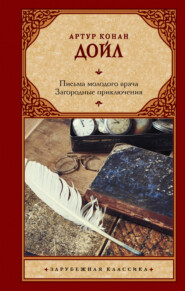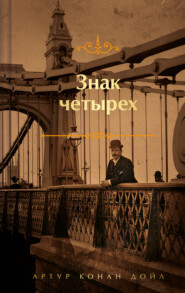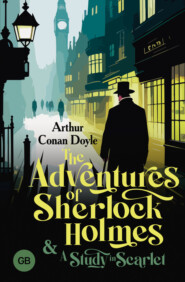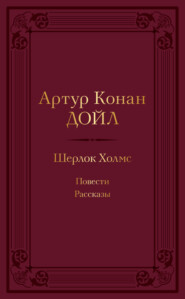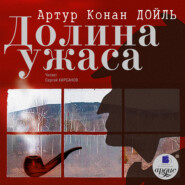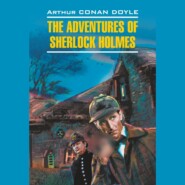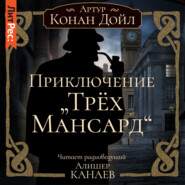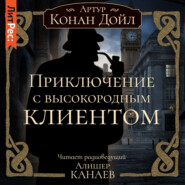По всем вопросам обращайтесь на: info@litportal.ru
(©) 2003-2024.
✖
Arthur Conan Doyle: A Life in Letters
Настройки чтения
Размер шрифта
Высота строк
Поля
I wrote a letter to Aunt Annette acknowledging the receipt of the History, and thanking Uncle Dick for it. It will, I imagine be very useful to me in the Matriculation. I am unusually pressed with work now, because Father rector’s feast is coming on, and I have been selected to write a poem for him, to be read on the Feast. We have trial examinations on every Friday in the different subjects for Matriculation. Today we have one in English History down to the Norman Conquest, and in Roman and Greek history.
I am in the first class in German, and getting on very well. We have 2 hours in the week for German, which is all that could be spared. The Father, whose name is Father Baumgarten, talks to us in German always, while teaching us. I like it very much.
to an unidentified recipient (fragment) STONYHURST
Its such fun—whenever I am hard up for a quotation I invent a few lines of doggerel, and prefix it by ‘as the poet sings’, or something of that sort. The lines are bad of course but I am not responsible for that, that’s the poets publisher’s look out. Thus the last lines of my essay are
‘It is said that a mother ever loves best the most distorted and deformed in her children, but I trust the saying does not apply to the feelings of an author towards his literary child, otherwise it bodes ill for this poor foundling. I cannot however conclude better than in quoting those cheering lines of the poet (?)
‘Fail or succeed, the man is blessed, ‘who when his task is o’er
‘Can say that he has done his best, ‘angels can do no more’
Tell Lottie to write at once; she ought never to put off till tomorrow what she can possibly put off till the day after. Many examples have been known, Lottie, of little boys who have driven into London tired and weary, with not more than a check [sic] for a few thousands in their pockets, and by steady work, and sticking consistently to that proverb, they have been able in a few years to leave London as fine prosperous beggars. So there is a chance for you yet, my dear.
Finally the day approached for him and other Stonyhurst boys in their final year to travel to London for a week of comprehensive University of London matriculation exams, ones which would play an important role in their being admitted to universities. It was a tense time for Conan Doyle, now sixteen years old, for much depended upon the outcome if he was to finish his education, join a profession, and support the family as he wished.
‘My noble sister Annette, who died just as the sunshine of better days came into our lives,’ he wrote in Memories and Adventures, ‘went out at a very early age as a governess to Portugal and sent all her salary home. My younger sisters, Lottie and Connie, both did the same thing; and I helped as I could. But it was still my dear mother who bore the long, sordid strain. Often I said to her, ‘When you are old, Mammie, you shall have a velvet dress and gold glasses and sit in comfort by the fire.’ Thank God, it so came to pass.’
to Mary Doyle STONYHURST, JUNE 1875
I was very successful in the trial examens, passing first class. I only hope I do as well in the real thing. You must offer up a communion for me on Sunday, I will go myself on that day and so get a blessing on my examens. Mr Colley, poor man, is very anxious lest anyone should be plucked, and so is the rector and all the community. The subject I got most marks for in the trial was French, I got 268 out of 300 for it. The other subjects I did well in were Greek, Latin, and Natural Philosophy. My weakest paper was chemistry, but I have studied it up since.
We have had almost continuous rain for three weeks. It is really very depressing and makes the mind so languid that it is hard to keep your attention on your work. I am looking forward to the Examen week. We are quite separated from the boys, having meals apart, and many privileges such as going to bed when we like, rising when we like and going out rowing on the ponds.
Goodbye Ma, the next letter I write will be after the examens and I will be able to tell you approximately how I have done, though I will not know for certain until a week after the examen. You know you must not expect long letters now, but I promise you a big fellow after the Examen.
to Mary Doyle STONYHURST, JULY 1875
The Examens are over at last, thank goodness, and I think we have all got on very well, though some of the examens were unusually hard. On Monday we had the Latin author, and latin grammar paper. I got through the first very well, and the second very fairly. On Tuesday we had Greek author, and French. I think I did them well also. On Wednesday we had Mathematics & geometry. I did better in the mathematics than in any other subject I think. The geometry I did not do so well but I think I did well enough to pass easily. On Thursday we had English History & Language, both of which I did well. On Friday we had natural philosophy (a very hard paper) and chemistry. I scrambled through them both very satisfactorily I think. During the examens we sat in a large room, each at his own little table, and the London examiner sat at his desk in front of us in order to see that all played fair. During the week I studied always from 7 in the evening to half past eleven, and from 5 in the morning to half past eight. I did not feel a bit sleepy during the examens, but I feel it now when all the excitement is over.
to Mary Doyle STONYHURST, JULY 1875
Hurray! I have passed all right. The post from London came late today, and the excitement among the boys to hear the news was fearful. At quarter to ten the post came, and the packet was taken to the rector as is the custom. For nearly quarter an hour [sic], which seemed to us poor fellows an age, the rector was perusing the news in his room. We could stand it no longer and pulling open the door of the playroom, regardless of the howls of the prefects, we dashed along the gallery up the stairs, and along the corridor to the door of the rector’s room. There were between forty and fifty of us, not all candidates, but many whose brothers or relations had gone up. There we crowded round the door all pushing and yelling. The door opened and the rector was seen inside waving the packet over his head. Immediately a tremendous cheer rung along the gallery, and dozens of handkerchiefs were tossed in the air, for we knew the news must be good. When the uproar had a little subsided, the old grey haired prefect of studies, more than sixty years old, got up on a chair and announced that of fourteen who had gone up thirteen had passed, the most that has ever passed since Stonyhurst was Stonyhurst. When Fr Kingdon tried to lead off another cheer his poor cracked voice failed him, but we soon drowned his hideous squeaks by tremendous cheers. I have shaken hands with every fellow in the house almost. I am now Arthur C. Doyle u.g. Somebody remarked I ought to add LY and then I would be UGLY.
The places are not given until next Sunday. Those who do unusually well are said to be in Honours. Those who do very well are in the first class, and those who do well are in the second class. My ambition is to get in the First Class.
Arthur Doyle undergraduate of the Royal London University
to Mary Doyle STONYHURST, JULY 1875
The classified list was read out this morning. Imagine my delight and surprise on finding myself in honours. The very highest class which can be attained, and in order to get which you must get
/
of the total of marks in each examen. I never in my life got such a surprise, and everybody else was equally as astonished. I nearly got a hole worn in the back of my coat by being clapped on it, and some enthusiasts carried me round the playground. There were 541 candidates went up; of these about sixty were in honours, and several Stonyhurst boys among them; Indeed it is the greatest triumph recorded in the whole annals of Stonyhurst.
Arthur Doyle u.g.
to Mary Doyle STONYHURST
I fear that we will come in so late that you will not be able to meet me conveniently. The train starts at four and comes in about ten I think. I am sorry to leave the old place after such a long residence, but I will be glad to get home again and see you all and Ida. Seven years continued routine becomes very monotonous eventually.
Tell Lottie and Cony I have a present for them. It is a lot of numbers of Cassell’s illustrated history of the war. The pictures ought to amuse them.
I wish Tottie was at home to see me, however I suppose she will come back before very long.
I get a prize for passing in Honours, which I will bring home carefully.
It was over, and he had done better than expected; certainly better than some of his schoolmasters had expected. Now he was done at Stonyhurst, with the good education for which Jesuits were famous, as Michael Conan had recommended. But he was never very sentimental about his school. ‘I don’t, looking back, consider the Stonyhurst system a good one,’ he later told Margaret Ryan, mother of his friend Jimmy Ryan, ‘nor would I send a son of mine there if I had one. They try to rule too much by fear—too little by love and reason.’
In his letters home Conan Doyle never touched upon one of the most important effects of his Jesuit education: his loss of faith in the Roman Catholic Church to which the Doyles were devoted. ‘Nothing can exceed the uncompromising bigotry of the Jesuit theology,’ he said in Memories and Adventures. ‘I remember that when, as a grown lad, I heard Father Murphy, a great fierce Irish priest, declare that there was sure damnation for everyone outside the Church, I looked upon him with horror, and to that moment I trace the first rift which has grown into such a chasm between me and those who were my guides.’
He did not write home about it. His mother might be someone whose advice (as he put it in his 1895 autobiographical novel The Stark Munro Letters) was ‘Wear flannel next your skin, my boy, and never believe in eternal punishment,’ but his father, said Conan Doyle in his memoir, ‘lived and died a fervent son of the Roman Catholic faith.’
Returning home, he found that the family’s circumstances had undergone more change. ‘My mother had adopted the device of sharing a large house,’ he said, ‘which may have eased her in some ways, but was disastrous in others.’ This comment, made nearly half a century later, was probably an oblique reference to one lodger in particular, Dr Bryan Charles Waller, who had already come to assume a powerful influence in the Doyle household. Only six years older than Conan Doyle, Waller would soon take over paying the family’s rent, usurping the role of the increasingly infirm Charles Doyle. Initially, young Conan Doyle warmed to Waller, who not only a notable physician but a published poet. But later his feelings would darken, perhaps over Waller playing a role that Conan Doyle would have liked to play instead. (And yet when he married in 1885, Waller acted as best man. Considerable speculation has been expended on Dr Waller’s relationship with the family, but too little data is available to reach firm conclusions.)
‘Perhaps it was good for me that the times were hard,’ he said. ‘[T]he situation called for energy and application, so that one was bound to try to meet it. My mother had been so splendid that we could not fail her.’ Edinburgh University had one of the best medical schools in the world, and that Dr Waller had trained there, and could help Conan Doyle prepare for the entry examinations, must also have had some bearing on the decision that he should study medicine too.
But Conan Doyle was still young for university at age sixteen. ‘I was dispatched, therefore, to Feldkirch, which is a Jesuit school in the Vorarlberg province of Austria, to which many better-class German boys are sent. Here the conditions were much more humane and I met with far more human kindness than at Stonyhurst, with the immediate result that I ceased to be a resentful young rebel and became a pillar of law and order.’
to Mary Doyle FELDKIRCH, AUSTRIA, SEPTEMBER 1875
You must be astonished at not having heard from me before, but I will begin my adventures from the beginning. I had a very pleasant journey down to Liverpool where I found we did not pass through the Exchange Station, so I got a cab from Lime Street Station and then got a train to Berkdale, which bye the bye is eighteen miles from Liverpool. I arrived at Berkdale and there at the station I saw a hoary headed old chap who proved to be Mr Rockliffe. He was a jolly old man, and took me up to his house where I was introduced to his two daughters and three sons. They were very kind hospitable people, and gave me a jolly dinner and a warm bed. Sunday passed in smoking, hearing mass, reading, walking, and playing billiards, and on Monday we were to set off. But in the middle of the night the greatest hurricane since 1839 arose. Nearly the whole top of the house was carried off like a feather, tiles and chimney pots were flying about and in the midst of the turmoil a messenger arrived from Mr Rockliffes brother, who was to take us, saying that he would not risk our lives by going in such weather. The result was that we stayed at Berkdale until the Wednesday morning when we set off. We went to London, then to Newhaven, Dieppe and Paris. I got into Paris late one night and we started early next morning, so I could not visit Uncle. I was so disappointed. I have only five minutes more time to write in so I must be quick and give you a full account of the journey in my next letter. The Alps are beautiful and the place is jolly I think.
to Mary Doyle FELDKIRCH, JANUARY 1876
I hope you have had a merry Xmas and a happy new year; will it be satisfactory if I write every second letter in French, as I can give you my news better in English?* (#ulink_627b3a24-5a8f-5b82-9417-1ec7e5d06a47) I am glad the letter pleased you, I meant it to be a little surprise. We keep Xmas very shabbily here having only Xmas and New year’s day free; I am an unlucky wretch and won nothing in the lottery, however it is a consolation that the money went to the pope.
It was extremely kind of Uncle Henry to send me the pound, and I am very grateful to him; I beg that you will keep the money, and buy something for yourself with it. Thanks for the scraps also; the fleet seems unlucky first ‘the Vanguard’ going down, and then ‘The Iron Duke’ having such an escape. What a whopping lie about the sea serpent that twisted two coils round a whale!
I am getting along very jollily, and am acquiring a whole lot of skating feats, so that when I come back I will be a respectable skater. What sort of a winter have you had? Here the cold is sometimes seventeen below zero; remember that in Napoleon’s retreat from Moscow, when the soldier’s fingers dropped off it was only just above 20° below zero on an average. When we get up at five, our water for washing, though in an artificially heated dormitory, is so thick with ice, that we must pound it with a toothbrush to get at it.
I have had such nice letters from Uncle Conan and Tottie, both of whom by the way are stamp collectors. I send you a bird’s eye view of the town, the whole of that massive building on the left is the college. I am sorry you do not obtain a view of the mountains on each side.
to Mary Doyle FELDKIRCH
As the Father did not send me any pocket money this month, I naturally remonstrated and was informed that there is some regulation, which it appears is on the prospectus, about parents paying quarterly before hand, their son’s pocket money. I hope that you will write about it at once to Father Meyer, the procurator, as I am at present in a state of complete destitution.
Slow indications of the return of spring are beginning to appear, and I fear the skating will not last much beyond the end of this month. I hear wonderful accounts of the heat here in summer, and of the various representatives of insect life which appear; as they may be interesting to that young lady, I will describe them in my letter to Lottie. As I wish to have afterwards some memorials of my year of exile, I send you two more photos. One is the town in another position, showing the river Ill, a tributary of the Rhine, and also giving a good view of the old medieval fortress overhanging the town, and of the cliffs. The other is a very famous pilgrimage about three miles from here, where very many miracles have been wrought. I saw preserved there a solid rock worn about two feet deep by the knees of a saint, who used it for a ‘prie-dieu’.
I saw another very curious thing; it appears that long ago a rich man died about here, leaving his money to the church. His brothers burned the real will, and having forged a new one, were proving their claims to the property before Judges, when the skeleton of the dead man appeared among the assembly and frustrated his treacherous relations by producing the true will. In memory of the event, a picture was painted, I believe by a spectator of the scene, and this I saw hanging in the church. There are many votive offerings too for miraculous escapes, which are highly interesting. Isn’t that a thumping mountain in the background, on the right hand side; take care you don’t mistake it for a cloud.
to Mary Doyle FELDKIRCH, MARCH 1876
What jolly letters Tottie writes, but like her lovely brother she is rather forgetting her orthography. I return the letter of the promising pupil, she seems a very nice little girl, but I think there is a tinge of selfishness about the other; don’t you think so? The first personal pronoun predominates too much in it, though, no doubt, that is natural in one so young.
The German gets on very well; when I speak fast I naturally have adjectives in the feminine before neuter nouns, and all that sort of thing, but I can always easily be understood, and I have attained so much volubility that twice a week, when we have our walks, I can keep up an unbroken conversation for three hours with two Germans; for in a walk we go in ranks three abreast, and an Englishman must always escort two Germans. I generally entertain my couple with descriptions of Captain Webb’s feat or the ‘Devastation’ turret ship, or the Channel fleet, or London or Stonyhurst, or fifty other things. I have just finished a history of Europe since 1789 (800 pages) in German, there are such funny mistakes in it, just such mistakes as one could imagine a conscientious thick headed, old German making. The old fellow was very much perplexed by the English name Hyde Parker, and split the poor man into two, remarking complacently that Admiral Hyde, Admiral Nelson, and Admiral Parker were at the battle of the Baltic. There are several other funny mistakes. I am reading the life of Frederick the Great by a famous biographer Onno Klopp. I read about 120 pages a day, though I don’t always understand every word, yet I am quick in making out a sentence






